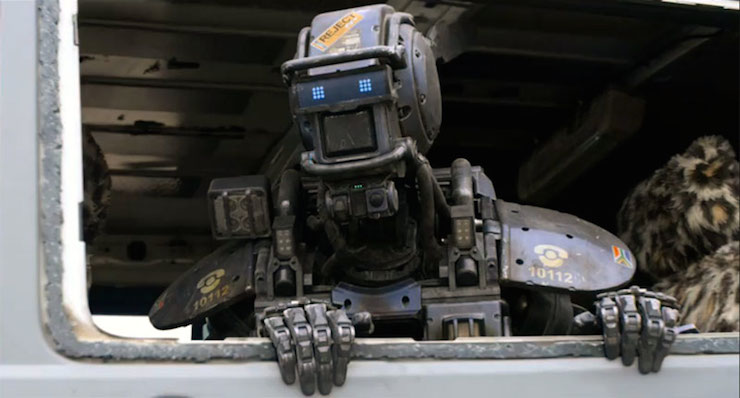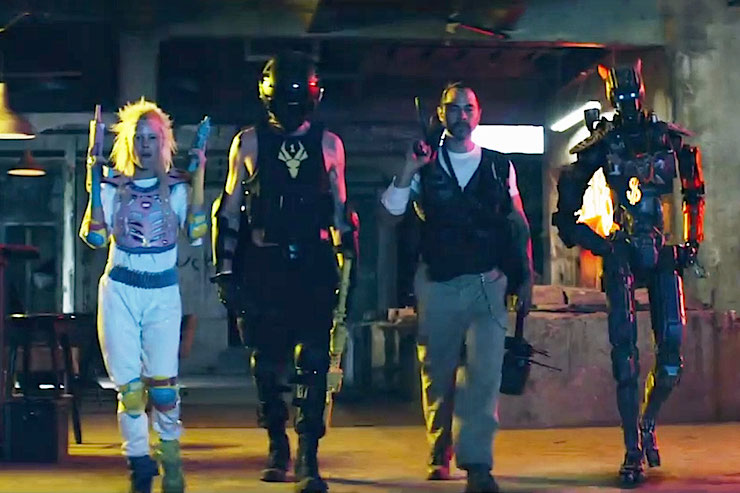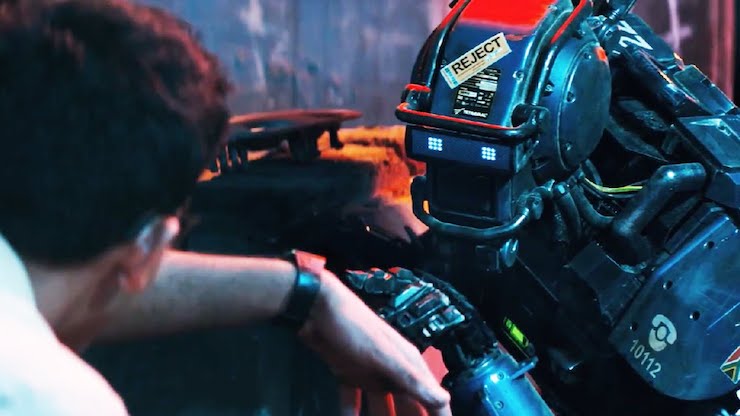Film these days is all about homaging the ’80s. Especially science fiction, and I suppose the leaning is understandable; sci-fi created some of its most memorable screen works during that decade, and the kids who grew up on them are adult enough to be nostalgic. But mimicry doesn’t always lead to transcendent results, so when director Neill Blomkamp took the stage for a Q&A before my screening of Chappie and informed us that the movie had a “Spielbergian” tint to it, I got a little nervous.
Turns out, if every film with a desire to homage could do it like Chappie, I’d never be worried again.
(Minor spoilers for the film below.)
Blomkamp blew most of the movie-going world away with his freshman achievement, District 9, but audiences were decidedly lukewarm about his next offering, Elysium. (Blomkamp himself has gone on record to state that he feels the film’s script wasn’t quite right.) Where Elysium seemed to overdo so many of District 9’s strengths, Chappie is a return to form that offers a new spin on age-old questions. It all begins when Deon Wilson (Dev Patel), a young scientist who has created a series of robotic police drones for a weapons corporation, reprograms one of those drones with fully-realized artificial intelligence. Unfortunately, the robot in question is hijacked by a small group of drug dealers who are in trouble with a kingpin. Thus Chappie (as he is named by his new “mommy” Yolandi) learns about the world in a way that his maker clearly did not intend.
I should probably give a disclaimer here: I’m a sucker for stories about robots and their various displays of humanity. To an embarrassing degree. I walked into that theater knowing there was no way I’d leave before running through a ream of tissues. If this is your thing, it will be hard for the movie to disappoint you. If you’re a harder sell, there are places where the film might be too on-the-nose for you. Even with that said, you’d have to be especially cynical not to find anything to love here. It’s also worth noting that Chappie (like District 9) was adapted from a short film that Blomkamp made during his time as a 3D animator.
There is a lot of 80s nostalgia woven into the film, even discounting Blomkamp’s Spielberg comments—including the film’s basic plot similarities to Short Circuit, of all things. But these easter eggs are far more design-based than anything. From the look of the police drones to the larger, more intimidating Moose (a direct shoutout to RoboCop’s ED-209), to Deon’s calculator watch, to Chappie’s accidental viewing of He-Man, the references are layered into the visuals and that makes it extra fun for fans.

Sharlto Copley is responsible for Chappie’s performance, and he (with the help of some excellent computer animators) turns in a performance on par with the likes of Andy Serkis and Doug Jones. Chappie is instantly lovable without being overly-sweet or lacking in substance—a problem encountered in more recent offerings like Earth to Echo. His mistakes are bad ones, and his development is like watching a human child on fast-forward. Blomkamp compared the film to E.T., and there are some similarities in spirit, but Chappie himself has much more in common with Pinocchio (or even David from A.I., who had his own wooden boy parallels). And becoming real is hard when the people in charge of your education have their own problems to worry about.
While there are very few consummately “good” people in this film, it’s refreshing that Chappie is not out to demonize the majority of them. The film seems to say in no uncertain terms: people who do bad things are not really the problem in this world—but people who are righteous? Desperate? They do untold damage. Still, that is hardly the film’s focus. It’s about invention. It’s about creating meaning between each other. It’s about love and existence, and how scary all of those things can be to our entirely un-omniscient brains.
With this film Blomkamp returns to South Africa, a move so desperately needed to continue combatting Hollywood’s entirely Western-centered view of the world. Fans of the South African Zef music scene will recognize two well-known artists starring in the film under their performance names; Yo-landi Visser and Ninja of Die Antwoord (and various other groups over the years). Blomkamp also uses the group’s music throughout the film, which he claimed was something he had wanted to include in the project from the beginning. Both Yo-landi and Ninja bring a rawness to the film that your typical Hollywood actor would not have been able to supply, and the use of their music adds depth to the setting.

The movie is definitely lacking in terms of narrative succinctness, which comes primarily from asking far more questions than it is capable of answering in two hours. That’s not necessarily a bad thing, but if you walk into the theater expecting one neat, compact message, it will likely fall flat. Technical know-how is not really a consideration here either—it’s window-dressing. In the Q&A, Blomkamp was clear that he does not believe artificial intelligence would ever come to pass in any situation like this; the film is ruminating on humanity and the ever-ephemeral soul, not on the state of technology. Still, the story would have likely benefitted from some down-scaling, a sharper focus on the core themes.
All of Blomkamp’s hallmarks are here, including moments of up-close personal violence that teeter deliberately on the edge of too-much. But there are surprising moments of levity in the film as well, a good humor that helps to alleviate some of the harsher realities. In effect, Blomkamp’s track record is working for him here; Chappie does not end the way you might expect given his earlier work. There is an optimism to this movie that allows it to stand out in beautiful ways. It’s not a perfect effort by any means, but its unique way of handling ancient sci-fi tropes makes it special. And the questions it leaves you with are deliberate—you are free to muse at your will.
Ultimately it’s not going to work for everyone, by I find myself recommending Chappie wholeheartedly. And since I suspect my heart is what the film was going for, I know that it did its job.
Emmet Asher-Perrin blames this movie for redoubling her desire to have a robot for a best friend. You can bug her on Twitter and Tumblr, and read more of her work here and elsewhere.










